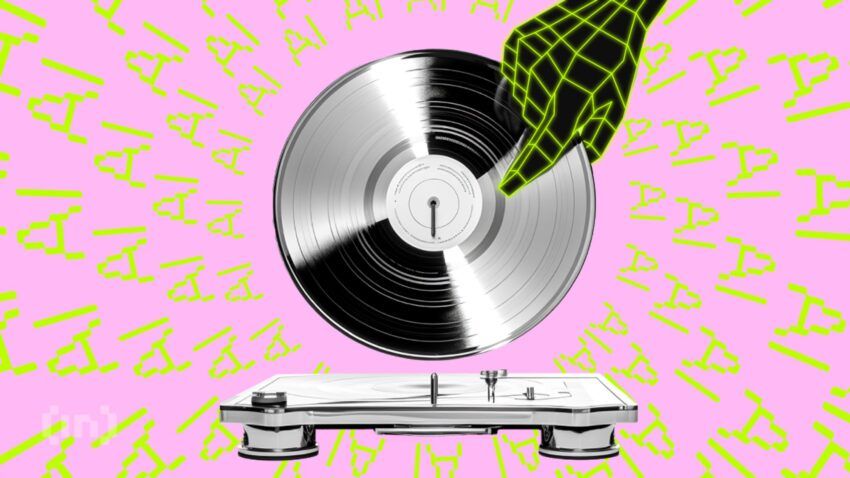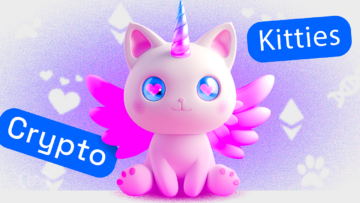Music NFTs promise to be a novel way of looking at the music industry and the way that artists are rewarded for their work. They could change the fortune of artists, create greater fan involvement, and ultimately change the industry for the better. Let’s take an in-depth look at what Music NFTs are and how you can use them as an artist or fan.
KEY TAKEAWAYS
► Music NFTs provide a new method for artists to monetize their work, connect with fans, and offer unique ownership experiences.
► The rise of music NFTs empowers musicians to bypass traditional music industry intermediaries, allowing for direct sales and increased financial and creative control over their works.
► Investing in music NFTs presents both opportunities and risks, as their value can fluctuate based on market demand and the rarity of the NFTs.
► Several platforms such as NFT TONE, Opulous, and Royal are emerging as key players, facilitating the creation, sale, and trading of music NFTs.
What are music NFTs?

As you may already know, NFT is an acronym for “non-fungible token,” a type of digital asset embedded into a blockchain network. The NFT certifies ownership of a unique asset. This economic concept of fungibility has significance. We need to remember the concept of uniqueness when evaluating NFTs.
A music NFT is a certificate that identifies the owner of a musical work. It can be sold to anyone, and the composition’s use is at the sole discretion of the owner.
NFT is a term that refers to all kinds of non-fungible tokens, which means multiple copies can exist and are owned or controlled by different parties. These tokens, secured on a blockchain, grant owners the right to music, album artwork, videos, or any other exclusive access to content.
In other words, both the music and the ownership provided by the NFT are important. Music NFTs can help musicians, bands, and composers connect with their listeners in new and innovative ways.
How do music NFTs work?
The principle behind music NFTs is the same when it comes to sales or production. The musician or band decides what content they want to offer their fans. This could be merchandise, concert tickets, audio files, etc. Then, they will choose the blockchain on which to mint their NFT. They will also choose which NFT platform to use or release their product.
Once an artist has identified their preferred platform, they will notify their fans about their NFT drops and then put them up for auction at whichever price they choose.
Music NFTs and all other NFTs cannot be duplicated. A music producer may decide to sell a one-off audio file. Here, the highest bidder is the owner of the audio file but not of the copyright.
They might also decide to make a small number of NFTs from the same audio file and then sell them on a music marketplace. Essentially, this is a new form of music distribution.
Each fan who purchases the music NFT becomes an owner of their favorite musician’s work. The NFTs can be stored in crypto wallets and sold to higher bidders if desired.
The musician who created the NFT may be able to resell it and make a profit. This is one of many ways in which music NFTs can empower musicians.
How music NFTs help musicians
The ways in which musicians can earn money have changed. This is due to changes in distribution and technology. However, musicians have always had a hard time retaining control over their work and monetizing it.
It was a common practice during the 1950s for various businessmen to exchange services for writing credits on songs. While record sales increased starting with the 1960s, few artists owned their recordings. Music labels and publishers often handle these things.
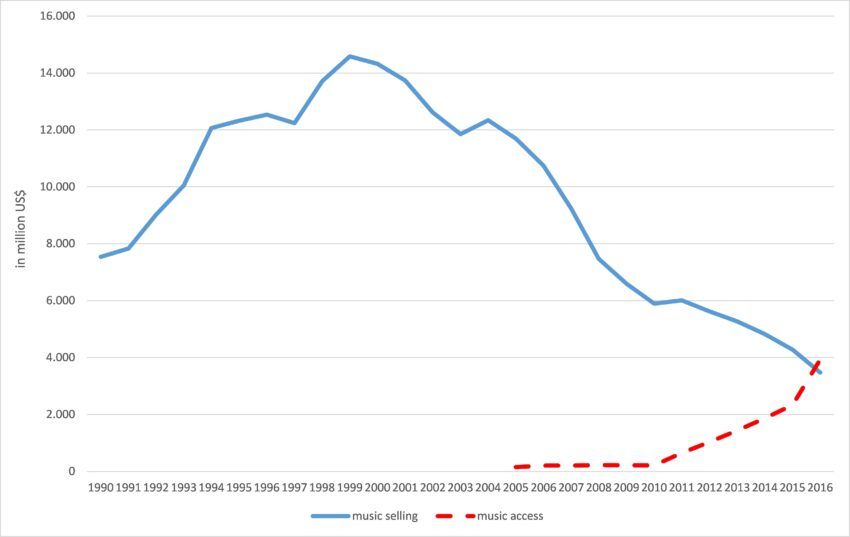
Since the 1990s, physical sales of music have declined. Streaming services took over, but numerous artists complained about the small financial rewards. Some musicians have even quit streaming platforms over fair compensation or misinformation concerns. NFTs can help them retain creative and financial control. There are several benefits:
- Royalties allow musicians who create NFTs to sell them to make a profit.
- Music NFTs also allow musicians to make money by selling their merchandise and music directly. This eliminates the need for intermediaries such as record labels, publicists, managers, etc.
- They can grow their fan base as well. NFT airdrops, for example, allow musicians to reach new audiences.
Unique fan experiences, such as the chance to meet their fans in person or virtually, are another possibility. Snoop Dogg and Post Malone have dipped their toes in these waters. Additionally, musicians can share collectible items. Aphex Twin, MF Doom, or Grimes have been involved in doing this.
Newer artists have great opportunities because there are no barriers to entry to the music NFT scene. No one expects them to release new music or fit into a particular box to get a record deal. Music NFTs allow musicians to simply upload their music to any platform that they choose and then market it to their fans.
How to invest in music NFTs
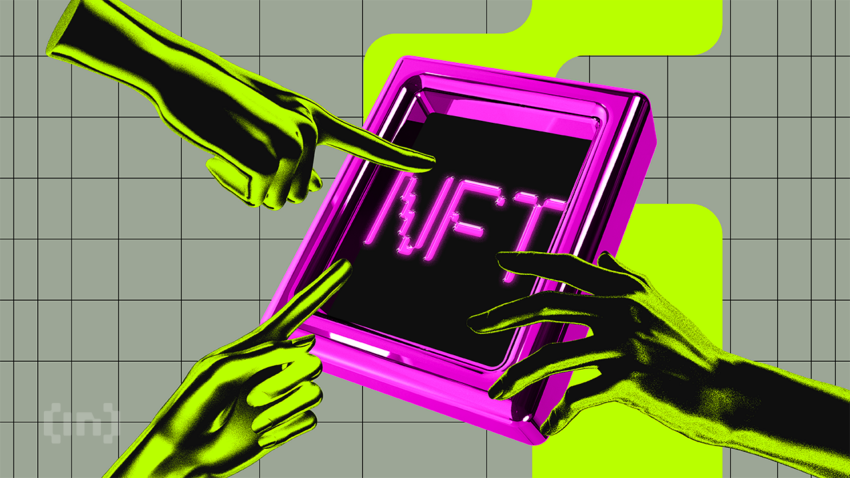
If you’re a crypto enthusiast, the question is whether to invest in music NFTs. This can be lucrative, in addition to supporting various artists. Music NFTs can revolutionize the industry, but profit is not a guarantee.
Music distributors often get 50% or more of the revenues from music distribution deals. As we mentioned earlier, artists receive little to no revenue. Music NFTs can boost revenue for artists and even allow small artists to escape label restrictions. Fighting for fairness is a worthy cause in its own right.
There are three main ways to invest in music NFTs at the moment:
- funding NFT marketplaces
- starting NFT collections
- using NFT funds
If you’re thinking of minting NFTs, you may create a closer bond with fans through blockchain technology. However, this incurs minting fees. If you decide to sell your NFT later, your resale proceeds will be reduced by gas fees, marketplace fees, and royalties for the original artist.
You will also need to decide on the music for your collection. Remember that music and art are subjective. Also, keep in mind the rarity principle of NFTs that we previously discussed. Rare or unique physical releases of music are often very valuable.
A good deal of music NFT projects produce large numbers of digital tokens that represent ownership of digital copies of music and accompanying artwork. By that very definition, these aren’t unique or even rare items. They can be replaced by many others just like them.
The most successful NFT projects focus on the supply of these tokens and not just the demand from fans. In other words, a truly rare NFT collectible item leads to better prospects for crypto enthusiasts.
NFT collections
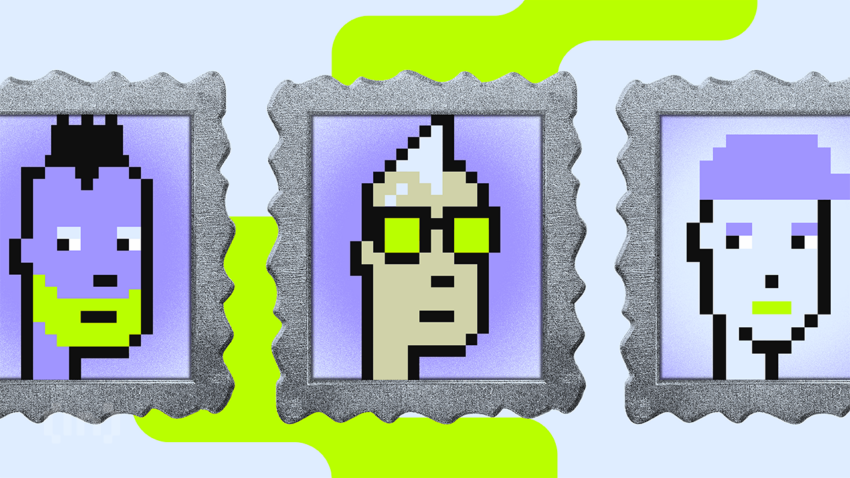
An NFT collection consists of numerous unique tokens from a single creator, album, or theme. One of the reasons why music NFTs are exciting is because they offer a novel way to consider supporting artists.
Besides helping their careers, creating an NFT collection rewards you for your foresight. If a new artist is successful in the future, and you own their NFT, you will also be rewarded.
Investing in a marketplace or in a certain cryptocurrency is similar to purchasing company stock. Meanwhile, buying music NFT is similar to purchasing art. It is important to weigh the pros and cons of each individual’s priorities. However, there are growing opportunities when it comes to building a collection.
Doja Cat and Snoop Dogg were some of the first pop stars to release highly successful NFT projects in 2021. Many music artists collaborated with digital content creators to assemble NFT collections that were successful that year. This inspired many to learn more about the world of digital assets.
NFT funds
NFT funds involve an asset manager opting to invest directly in non-fungible tokens. For example, one famous CryptoPunks NFT owner launched such a fund. It focuses on investing in NFTs on behalf of users. Various institutional investors have shown great willingness to look into these prospects.
One of the benefits of NFT funds is the lower risk involved in starting an NFT collection. These NFT funds have received a fair deal of exposure. The services allow users to use NFTs, especially from popular collections like Bored Ape Yacht Club, as collateral.
Top 3 NFT marketplaces for music NFTs
Choosing the right NFT marketplace for your needs is a complicated task. If you’re looking to invest or sell your music right now, here are 3 NFT marketplaces worth investigating.
| Platform | Blockchain | Description |
|---|---|---|
| NFT TONE | Binance Smart Chain | Music NFT creation and trading, artist support |
| Opulous | Arbitrum, Ethereum | Music NFTs linked to royalties, loan services |
| Royal | Ethereum | Ownership sharing in music rights, NFT sales |
1. NFT TONE
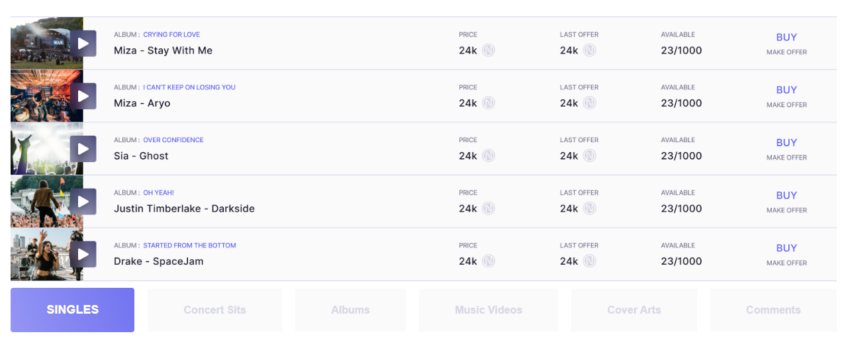
NFT TONE focuses on music. It allows users to collect rare pieces of music, including first editions of recordings. Besides, the platform looks to embrace the sentimental value of owning an NFT from your favorite artist. The platform features its native token TONE. It runs on the Binance Smart blockchain.
2. Opulous
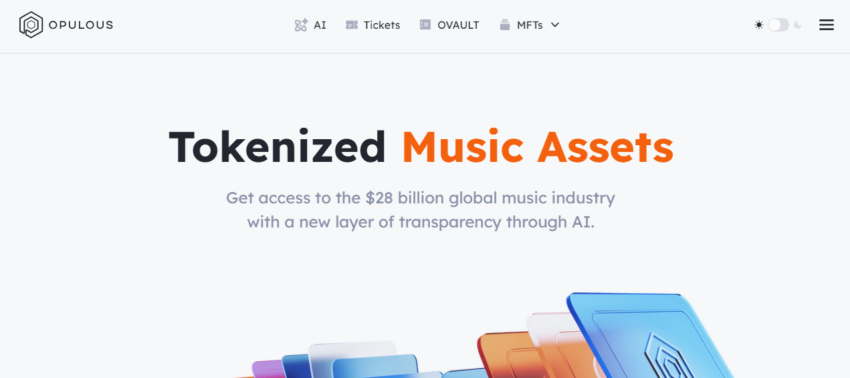
Opulous aims to involve fans in the success of their favorite artists. The buyers will own a share of the music copyright through their tokens. These NFTs generate monthly royalty revenue. Furthermore, the NFTs can become more valuable as an artist’s career progresses.
3. Royal
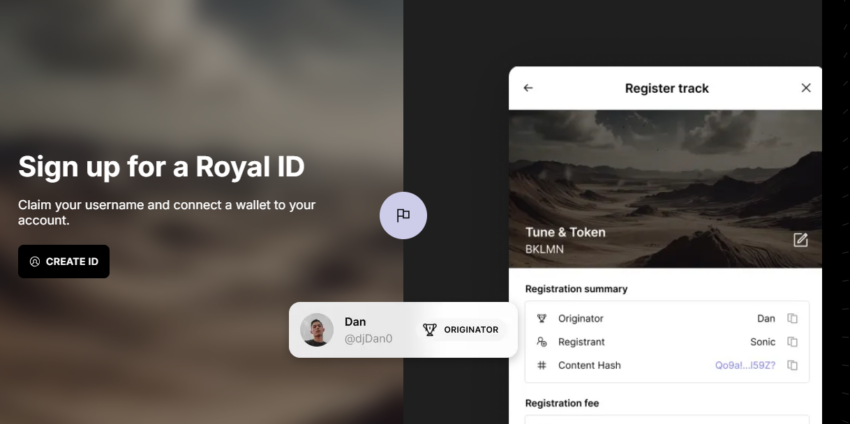
Similarly, Royal promises to sell song rights in the form of music NFTs and features an original song by rapper Nas with its launch. Users are encouraged to support artists whose popularity will increase over time.
Ultimately, OpenSea remains the most popular NFT marketplace, for music and all other types of NFTs.
Will NFTs truly disrupt the music industry?
Uniqueness is one of the most important features that non-fungible tokens share with music. Therefore, it is only natural that they cross paths at some point. Music NFTs are more than just a game of numbers; however, understanding popular culture and where the zeitgeist will move next is important if you are an investor.
Are music NFTs a worthwhile investment? Quite likely. You’ll need to trust your gut and analyze their value on an individual basis. You will also need to evaluate your risk tolerance.
NFTs can be hard to keep up with, so why not join BeInCrypto’s Discord server to ensure you’re on top of everything?
Frequently asked questions
What are music NFTs?
Can music be sold as NFT?
How are musicians using NFTs?
What is the best NFT marketplace for music?
Disclaimer
In line with the Trust Project guidelines, the educational content on this website is offered in good faith and for general information purposes only. BeInCrypto prioritizes providing high-quality information, taking the time to research and create informative content for readers. While partners may reward the company with commissions for placements in articles, these commissions do not influence the unbiased, honest, and helpful content creation process. Any action taken by the reader based on this information is strictly at their own risk. Please note that our Terms and Conditions, Privacy Policy, and Disclaimers have been updated.


